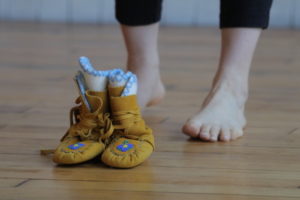Chapter 21: Healing and hope in process on World Down Syndrome Day
- Home
- Features 2020 - 2023
- Chapter 21: Healing and hope in process on World Down Syndrome Day

By Tessa Perkins Deneault
Twenty-one days after her son Sami was born, Starr Muranko was diagnosed with breast cancer. Sami was born with an extra chromosome 21 (Down syndrome). Muranko’s chemotherapy treatments were 21 days apart. It’s commonly believed that it takes 21 days to form a new habit. Muranko describes this “collision of events” as a time of soul searching and learning. Now cancer-free and ready to share her story, the Vancouver-based dancer/choreographer has created a new work based on this difficult period in her life.
Supported by Raven Spirit Dance, where she is an artistic associate, Chapter 21 premieres at the Firehall Arts Centre in the fall. But an upcoming opportunity for the number 21 to surface in a meaningful way takes place on March 21, World Down Syndrome Day, when a documentary about Muranko’s creative process will be streamed free or by donation, available to the end of the month.

About a year and a half after completing her treatments, Muranko knew she wanted to share her experiences from this chapter of her life, and dance was the best way she knew how. “I thought to myself, I want to give my body some space to be able to express what it just went through,” says Muranko. “It was huge — physically, emotionally, spiritually, mentally — on all of those levels.”
When she returned to the studio, Muranko began by writing themes on cue cards and recording herself talking in a stream of consciousness style about her experiences. She then improvised choreography to accompany the voice recordings. Over time, scenes and sequences developed and some moments were told through movement alone.
In 2019, excerpts were shown at the Dancing on the Edge festival, Dance in Vancouver biennial showcase and Matriarchs Uprising: Indigenous Women Dancing Stories of Transformation. These work-in-progress showings helped Muranko to better understand Chapter 21’s purpose. “I realized this is actually a piece that I want to use not only to support my personal processing and healing, but also to share a larger message.” She says the work may provide an audience with opportunities or permission to talk about difficult events that are a part of the human experience.
Muranko’s Indigenous culture permeates the project on a few levels, including collaboration and mentorship from many Indigenous artists: Yvette Nolan, a Canadian playwright of Algonquin heritage, was brought on as director to help develop the script and narrative arc; Raven Spirit Dance artistic director Michelle Olson served as a mentor; Australian Indigenous theatre-maker and choreographer Jacob Boehme encouraged Muranko to continue writing about her experiences (some of which served as the basis for a few key scenes); and Cree Métis dance artist Jeanette Kotowich designed the costumes.

A key prop is a pair of moccasins that now belong to Muranko’s son Sami and represent him in the piece. She received them while visiting Moose Cree First Nation in northern Ontario to research before 7 after, a piece about seven generations of Cree women in her family. The moccasins carry personal meaning: Muranko saved them for years, hoping to one day give them to her child. Other props include the wig she wore during cancer treatment and a pair of blue shoes that her grandmother gave her the last time they saw each other.
“In all the work I’m doing, and in particular Chapter 21, it’s about creating and holding a space where I can connect with all of these different parts of myself,” says Muranko. “Some of them are connected to ancestral lineage and blood memory, and memory that I carry in my body, my bones.” She describes her Indigenous worldview as something she brings to her work in terms of values and belief systems, including the idea that her ancestors from the previous seven generations are with her while she looks to the future and considers the impact of her actions on the next seven generations.
Sami, who is now three, has also given Muranko a new perspective that she says helps her find focus and has made her a stronger artist. “He is the most amazing, magical little guy. He just brings me so much joy, and I think people will see that in the piece.”
With resilience and learning to adapt being themes of Chapter 21, Muranko says adapting in the face of COVID-19 delays has been an interesting real-world parallel to the creative work. The premiere, originally planned for September 2020, has been rescheduled multiple times, now to September 2021. As Muranko gains distance from the experiences explored in Chapter 21, she says that creating this work has allowed her to look at things in a new context. She hopes audience members will leave with a new perspective of their own: “I want people to remember the importance of being brave and being kind. And to leave feeling hopeful about life, in whatever way that looks.”

